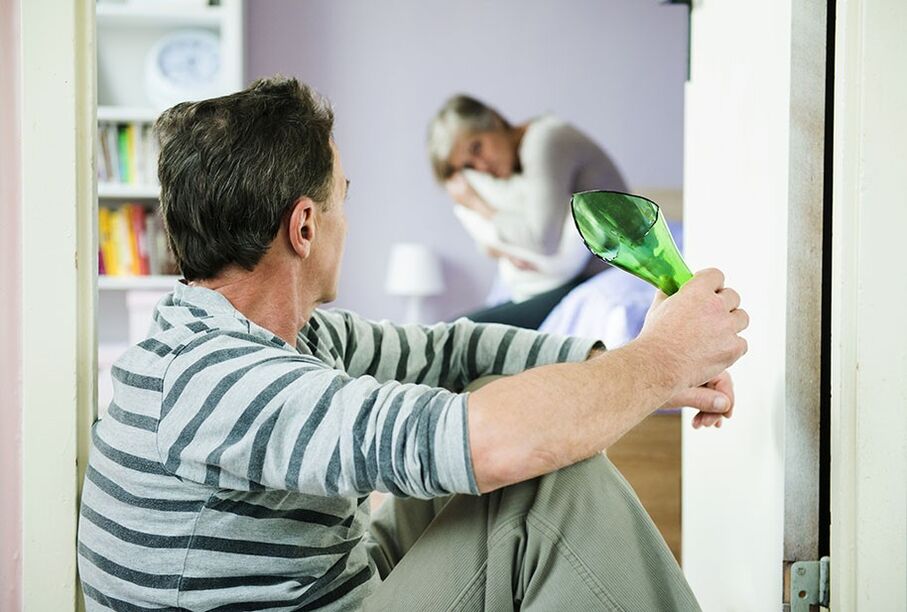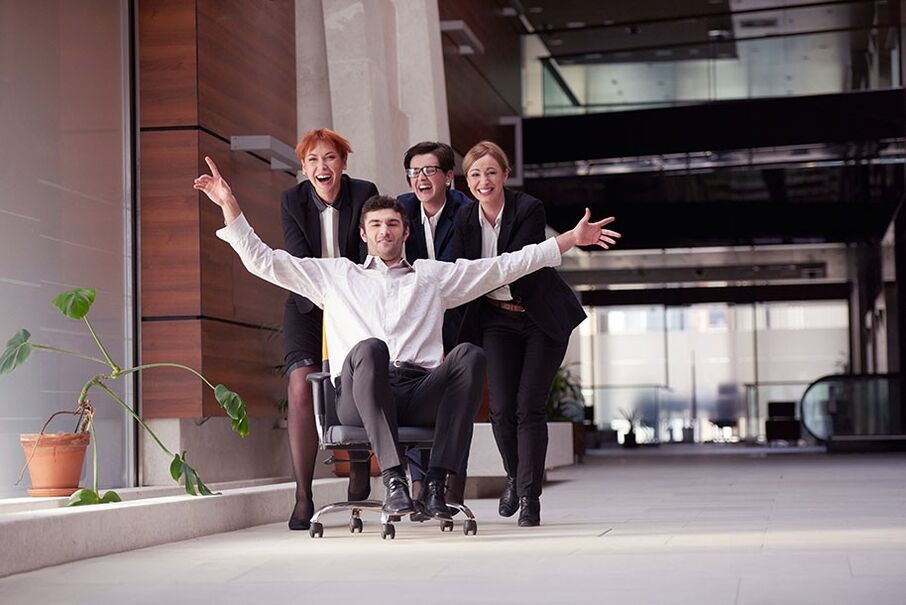Who should give up alcohol altogether?

- Alcohol addiction can progress quickly - withdrawal symptoms appear and you can no longer reduce the amount of alcohol you drink on your own.
- Drinking alcohol can worsen some physical or mental illnesses.
- Even small amounts of alcohol can lead to a loss of self-control—reckless behavior, excessive spending, and aggression.
- Pregnancy is planned.
Alcohol Abstinence Calendar: What to Expect When You Quit Drinking?
"I wouldn't say I drink too much or too often. But the mandatory minimums are as follows: Friday cocktails with friends, a few beers a week and a fun movie, Sundays with my husbandDinner and 1-2 glasses of wine. The decision to quit drinking completely was unexpected. I just wanted to test myself to see if I could quit drinking completely, which would be nice. When I quit my job, my life changed a lot. When I told my friends that I stopped drinking, they took it as a joke and didn't believe it for a long time. They thought I was pregnant or sick because of the decision I made. My husband and my acquaintances were not immediately accustomed to my full sobriety. Even my mother was skeptical about the decision and asked if everything was going well. It's strange, but sobriety is something unusual in people's understanding. Quitting drinking was not easy for me. No matter which festival I came to, people I knew and didn't know were trying desperately to get me drunk - "for your health", "drink a little". There are enough temptations. But I persisted. It took me a few months to get used to alcohol's absence from my life. After a few months, I noticed I had lost weight. All those beer and wine snacks were clearly taking a toll on my figure. I started sleeping better - feeling more energetic in the morning. My husband and I continued to meet up with friends. But there are far fewer banquets and noisy gatherings. It turns out that without a stimulant in the form of alcohol, loud music in a bar would just be a nuisance. I think it's all a positive change - I have a lot of free nights. Also, there is no hangover feeling in the morning. My husband and I signed up for a dance school. It’s not just the party that brings joy. I haven’t had a drink for six months now. I don’t want to interrupt my sober lifestyle – I love it. I am happy with everything that has happened since I quit drinking. It's like I've become freer. "
| a period of time | physical and emotional changes |
|---|---|
| first day | After years of drinking, even one day without drinking is an impressive amount of time. The body will "need" another dose of ethanol. The first thing people who quit drinking alcohol have to deal with are some severe withdrawal symptoms. Symptoms include: nausea, constipation, or diarrhea; dizziness; headache; trembling hands; elevated body temperature; mood swings |
| the next day | Symptoms of alcohol withdrawal syndrome were slightly less severe than on the first day. But the body is still going through an active detoxification process - removing the breakdown products of ethanol. This may be accompanied by abdominal pain. Sometimes, the liver may experience discomfort during the body's recovery process. My head continued to pound. A person who begins to struggle with addiction will seek solitude, become irritable and sometimes aggressive, and suffer from insomnia or nightmares. He sees everything as black - as if things will always be this bad. Therefore, it is most difficult to cope with the desire to drink during the first few days. I want to get rid of this torture as soon as possible. At this point, severe anxiety and panic may occur, sometimes even obsessive thoughts: If you don't drink, you will die. A serious condition of the body makes everything even more serious: in the process of adapting to work without drinking, all systems of the body malfunction, which is why this terrible impression occurs - "If I had not drank, I would die now". " " |
| The third day | On the first day after quitting drinking, your body begins to recover. Physical health improves. But the spirit is still at its "limit". Even the sound of a dripping faucet can irritate an addict. Mood swings can trigger headaches and aggressive behavior. Sleep is still disturbed |
| Day 4-5 | Withdrawal syndromes in addicts in the first and second stages of alcoholism almost completely subside. People who quit drinking will develop cravings. But large meals can cause nausea and intestinal problems |
| Day 6-8 | The addict's withdrawal symptoms completely disappear. His mental state improved significantly. About 7 days after quitting drinking, sleep returned to normal. A person begins to sleep more soundly, which means he feels more awake than before. A surge of energy often makes you want to exercise. The person's skin tone improves (swelling and erythema disappear), the tremors of the hands stop, and the functions of the gastrointestinal tract normalize. |
| 2 weeks | Over the next week, the thought process is restored—awareness becomes clearer and the confusion in the mind eventually disappears. The headaches no longer bother me. Doctors pointed out that after 2 weeks of complete abstinence from alcohol, the heart rate and blood pressure returned to normal, shortness of breath disappeared, and breathing recovered. People who quit drinking may gain weight during this period. Some people try to compensate for their abstinence from drinking with delicious food. |
| moon | By the end of the first month after abstaining from alcohol, the body will eliminate the breakdown products of ethanol. However, the psychological state can be severe: often, the person feels sad and depressed. He lost his usual behavioral patterns and that was stress. Now he needs to figure out how to live further, what to do, what to do, what to do, etc. After going through the first stage of withdrawal, he was thankful and enjoyed his sober life for several days, but then the "motivational struggle" began - "to drink or not to drink", which led to tension and risks. . Developing depression. On the one hand, a person knows that he is feeling better and enduring severe pain, but cravings and developing behavioral patterns do not allow him to completely quit drinking. A person is between "survival and destruction", he begins to look for reasons to drink, he looks for excuses. Hence increased mood swings and irritability. It might be easier if you prepare for it, that is, understand that it is inevitable, but only temporary and will pass soon. But the physical condition improved - the teeth became whiter, the swelling on the face and limbs disappeared, and the dark circles under the eyes disappeared. The trembling hands, if they had existed before, didn't bother me anymore. Active recovery of liver function during the first month and subsequent months after alcohol abstinence |
| 3 months | When a person stops drinking alcohol, their immune system starts working at full capacity. This person is healthy and energetic. He has learned how to spend his free time without drinking and find a fun activity. Even if you abstain from drinking for a long time, there is no guarantee that a person who starts drinking again will not relapse. The risk of recurrence remains high. If your hand reaches for a bottle of wine during a difficult time in life, you need to stop yourself. Only willpower can help you persevere |
| six months | 6 months is an impressive period of sobriety. People struggling with addiction often find interesting interests and hobbies during this time. It helps you enjoy life without thinking about alcohol. |
| Year | The physical and emotional state of abstinent alcoholics is stable. One realizes that life without alcohol is wonderful. He actively communicates with friends and family to seek life goals and achieve them. After long-term abstinence from alcohol, the liver and kidneys will fully recover if no serious pathology in organ function has been previously diagnosed |
Sudden alcohol withdrawal: Mistakes, consequences
Benefits of a Sober Lifestyle

- in excellent physical condition
Drinking alcohol can negatively affect the condition of most organs. Even "light" alcoholic beverages can damage the liver, kidneys, pancreas, cardiovascular system, and gastrointestinal tract. Abstinence from alcohol can effectively prevent many serious diseases that lead to premature death. In general, a sober lifestyle strengthens the immune system. Say "no" to alcohol and you'll find you get sick less often during the winter. The condition of your skin, hair, and nails will improve within the first month of sobriety. You will notice that your appearance looks much better. - Sweet dream
There's a school of thought that having a few glasses of wine in the evening can help you sleep better. This is a myth and it’s time to stop believing it. When the effects of alcohol wear off, a person may wake up, which disrupts his rest. Even after drinking a small amount of alcohol, sleep can become restless and shallow. Sleep can be restored after 2-3 weeks of complete abstinence from alcohol. Your rest won't disturb anything, which means you'll feel good in the morning. - Feel comfortable
Many people believe that alcohol is a good antidepressant. But the truth is, it only brings a short-term good mood. Then apathy, aggression and guilt ensue. All the negative emotions will disappear, you just need to drink more. This is how psychological dependence on alcohol develops - without the stimulation of alcoholic beverages, a person stops enjoying life. Through a sober lifestyle, you will gradually learn to be happy without drinking. When withdrawing from alcohol, the body "resists" this and demands another dose of stimulant. But in just one month, you will see the world in a completely different light. - Excellent memory
Scientists have found that drinking alcohol reduces a person's memory ability because ethanol gradually damages neural connections in the brain as addiction develops. "Experienced" alcoholics have a hard time remembering addresses or any dates. But the destruction of neural connections is a reversible process. All you have to do is stop drinking. By giving up alcohol, you'll find that your thinking becomes clearer - any information will be absorbed and remembered better, and your brain's overall performance will improve. I believe that memory efficiency can be restored in an average of 2-3 months. - financial stability
Positive physical changes are not the only benefit of quitting drinking. Another nice benefit is saving money. High-quality alcoholic beverages are expensive - which can be a big hit on the budget. Calculate for yourself how much you could save each month if you gave up your daily bedtime glass of wine.
9 Tips to Help You Stop Drinking

- take a sober break
For those of you who are not used to not having a drop of alcohol in your life these days, you can try tricking your brain. A good option is to "take a sober break. "That is, first set yourself an achievable goal - no drinking at all for 30 days. It would be a break from an established lifestyle of drinking regularly. Maybe, after experiencing all the positive changes of quitting drinking, a brief pause will give you the motivation to quit drinking for good. - Find a fun hobby
Replace bad habits with useful ones. This will distract you during those first, most difficult weeks of abstaining from alcohol altogether. Fun hobbies calm you down and give you positive emotions. If before only alcohol brought positivity, now it will become a hobby. Think about what business you want to do and start it without hesitation. - Relieve irritation through exercise
Withdrawal syndrome is definitely accompanied by mood swings. Sadness, overwhelming joy, aggression, irritability—addicts can experience a wide range of emotions within an hour. This is unsettling not only for himself, but also for those around him. According to anesthesiologists, exercise can help your body after you completely stop drinking. Physical activity relieves mental and emotional stress and distracts from negative thoughts. Getting used to regular exercise can be difficult, but over time it gets easier and the effort is well rewarded. You will become calmer, plus you will tone your body and strengthen your immune system. Physical activity helps in the initial stages of abstinence from alcohol, known as the "pink period. "In this case, it is recommended to first obtain permission from your doctor. - Start planning your day
If you quit drinking, you will have to learn to plan your days (at least at first). Keep free "windows" in your schedule as small as possible - so you won't be tempted to kill a boring night with a glass of wine or beer. Literally, after a month, you won't have to put too much burden on yourself - you will have a lot of interesting hobbies. - show some willpower
Most likely, sooner or later you will face temptations - a party with friends, a feast with relatives. Show willpower and stop drinking. This may be unusual at first, but soon you'll learn to have fun without any stimulants. There is no need to stay home even during temporary sobriety. Meet up with friends and loved ones. But make sure in advance that there are plenty of non-alcoholic beverages at the party. - Tell the world your wishes
Share your decision to stop drinking with those around you (at least those closest to you). Friends and family will definitely support your goals. With such a foundation, you can overcome any difficulty. Plus, you'll minimize the risk of a meltdown - your friends won't push you to drink, knowing you've made a serious decision to stop drinking. Blogging on the internet will be helpful to someone. It inspires. Share your successes and failures with your subscribers and gain their support. - Start a sobriety journal
Not ready to go public with your goals and plans? Then start writing a personal journal. This is also useful for breaking bad habits. In a diary, record the daily process of quitting drinking: your physical and emotional state after quitting drinking, and your future plans and goals. - Don't get frustrated if you make a mistake
No one is immune from making mistakes while achieving their goals. Considering how difficult it is to break a bad habit, don't blame yourself if your attempts to quit drinking permanently fail. This is not a failure, just a difficulty on the right path. Let it serve as extra motivation so you don’t fail next time. - Leverage behavior change techniques
The goals of a sober lifestyle deserve respect. But you don’t have to go alone. The process of quitting drinking completely will be much easier if you seek help from a psychologist. Behavioral psychology is based on changing destructive behavioral patterns and has shown effectiveness in combating addiction. Behavior change techniques show good results. This course will help you beat your alcohol addiction quickly and effectively. Completing the course will help you develop a positive attitude and stop drinking. You will learn a healthy behavior pattern that is necessary if you set yourself the goal of finally saying "no" to alcohol. This training will help you transition to a sober lifestyle with minimal physical and mental discomfort. You'll realize how wonderful life can be without alcohol - with a stable emotional state, efficient performance, and good health. Work with a psychologist for up to 6 weeks on behavior change techniques. You don’t need to share that you are training with your friends or even family. Courses are strictly confidential and can be attended at a time convenient for you. Experts answer all questions and provide advice via email, chat and phone.
























